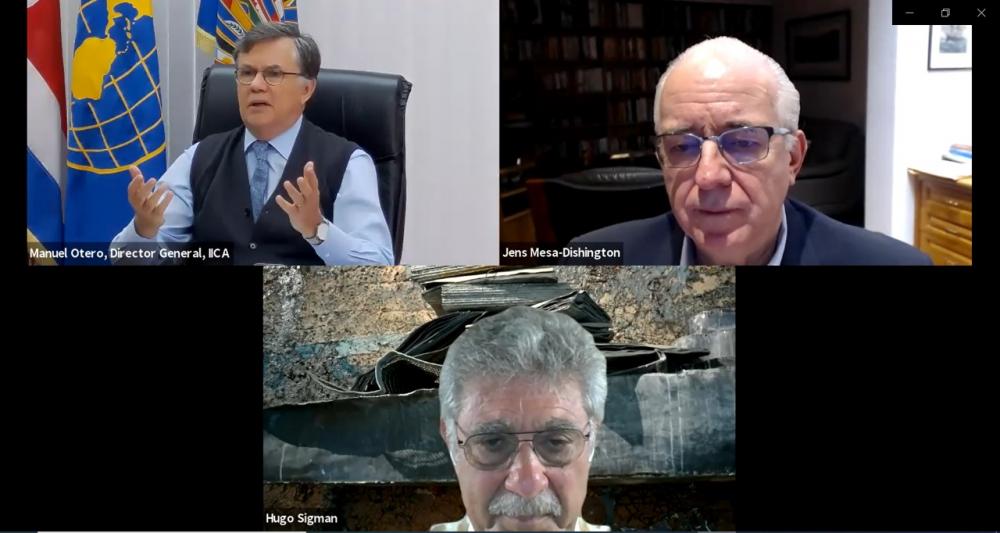Jens Mesa, Executive President of Colombia’s FEDEPALMA, and Hugo Sigman, CEO of the Grupo Insud in Argentina, participated in an IICA session to discuss how to create an enabling environment to increase the competitiveness of Latin American companies.
San Jose, 20 August 2020, (IICA). Promoting public-private partnerships will be essential in strengthening and sustaining the boom in agriculture amidst the pandemic, as well in spurring the economic reactivation of Latin American and Caribbean (LAC) countries.
This was the view of two prominent entrepreneurs in the region: Jens Mesa, Executive President of Colombia’s National Federation of Oil Palm Growers (FEDEPALMA), and Hugo Sigman, CEO of Argentina’s Grupo Insud – a conglomerate of businesses involved in the life sciences; agribusiness; information and culture; and nature and design.
The businessmen, who are both Goodwill Ambassadors of the Inter-American Institute for Cooperation on Agriculture (IICA) on matters related to sustainable development, offered this suggestion during a high-level discussion with the Director General of the Institute, Manuel Otero.
These virtual meetings are part of the efforts of the specialist agency for agricultural and rural development to assist in minimizing the impact of the pandemic on food security.
Mesa, who has been recognized as a forceful figure who helped to modernize Colombia’s agriculture sector, argued that, “This pandemic has put agriculture on the map again. I say this because in many places it had been undervalued in comparison to other sectors. Moreover, in order to efficiently satisfy the requirements of agrifood chains, the roles of the private and public sectors must change. We must organize ourselves to prevent production units from shrinking and becoming less efficient”.
The President of FEDEALMA pointed out that the private sector “should play a more active role” rather than waiting on “governments to take the initiative”, since the only way to achieve greater cooperation among stakeholders and to strengthen agricultural activity in the future is through the combined efforts of the sectors”.
Sigman, whose work has contributed to the creation of a more equitable society, through research and a concern for sustainability and development, remarked that public-private partnerships are what ensure a more competitive agriculture sector.
He emphasized “the importance of public-private sector linkages; the incorporation of knowledge into production; and the need for our countries, ourselves as producers, as well as the private sector to pay close attention to this issue, as the factors that will allow the region to succeed and make significant strides to compete internationally.
Given the pivotal importance of staple items, agriculture is the sector that at this time has been least affected by the economic recession caused by the Coronavirus. However, not all the countries and chains in the region have suffered the same impact. In April, the countries with the greatest growth in agricultural exports were Brazil (30.92%), Costa Rica (8.2 %), Argentina (4.9%), Bolivia (4.9%), and Guatemala (4.7%), while others experienced a significant fall-off in agricultural exports, for example, Perú (41.7%) and Uruguay (16.8%).
Some of the products that experienced the most growth in exports were soybean, sugar, beef and pork, whereas, in Central America, exports of coffee, banana and prepared foods grew the most.
More science, innovation and technology
The businessmen indicated that it is imperative that Latin American and Caribbean countries invest more resources in research, science and technology for the agriculture sector, and move towards digitalizing agriculture and introducing more efficient, sustainable and inclusive production systems, for which public-private synergies have become indispensable.
Sigman commented that, “Our countries still do not place sufficient value on science’s role in production, as our budgetary allocations for research, science and development are low. If we want to significantly improve crop production, upgrade equipment, use fertilization techniques or apply weed control, the linkage between the public and private sectors must be strengthened”.
Mesa cautioned that, “The more that we organize ourselves and make better investments in science and technology, we will be able to enhance productivity and the efficiency of processes, while significantly cutting costs. However, this requires institutional support.
The entrepreneurs also stressed the importance of strengthening family farming; fostering good agricultural practices and the efficient use of natural resources, such as soil and water; prioritizing education through technical agricultural schools and promoting investment and finance.
Jens and Sigman emphasized that IICA would play a pivotal role in processes to successfully bolster public-private partnerships and to make headway in matters of innovation, technology transfer and other areas, with the Institute serving as a bridge between parties. Head of the technical cooperation agency, Manuel Otero, endorsed this viewpoint.
In closing, Otero insisted that, “IICA is promoting discussion because we believe that this is critical. We are expanding our map of strategic partnerships, continuously forging linkages and developing networks. We are available to all entrepreneurs who have a social responsibility to develop the agriculture sector, so that it remains in the spotlight and so that rural areas become sources of progress, peace and employment”.
More information:
Institutional Communication Division.
comunicacion.institucional@iica.int












